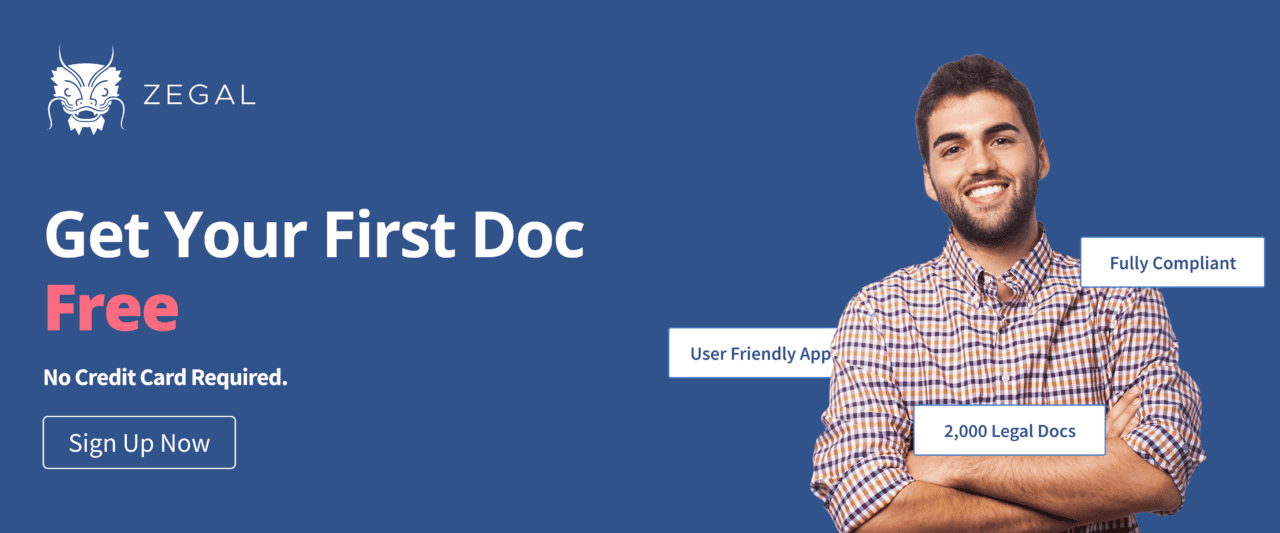Table of Contents
A business partnership begins when two or more people start a joint business with their contribution or investment.
When starting a new business partnership, there are certain essential documents a partner may need to carry out a healthy business.
Legal requirements for partnership business
Here is the list of partnership business documents you will need for your new partnership business:
Business Partnership Agreement
A business partnership agreement sets out what is expected from each of the partners, how critical decisions are made, and how profits (and liabilities) are divided. Legal documents for partnership businesses should cover the partners’ rights and responsibilities, who owns what, and what will happen if and when partners decide to leave the partnership or new ones join.
Why do I need a business partnership agreement?
- The partnership agreement clearly outlines the partners and their percentage of ownership.
- Some partnerships are general partnerships, with partners sharing responsibilities and liabilities. Other agreements are limited partnerships, with one or more partners acting as an investor with limited or no activity in the business and little or no liability.
- An effective partnership agreement describes how the business can be dissolved or a partnership transferred.
- Partnership agreements can lay out who owns assets, such as the business name, customer list, and more the business is dissolved.
Dissolution of Partnership Deed
Partnerships fail or are dissolved for a variety of reasons. A Dissolution of Partnership Deed helps to properly wind up the partnership and divide any assets or liabilities.
Why do I need a dissolution of partnership deed?
- A dissolution of partnership agreement contains the terms under which the partnership will terminate.
- A written dissolution of partnership agreement allows partners to address any debts that might survive the partnership, agree on the distribution of remaining assets and address any other remaining issues.
- The agreement can also later serve as evidence that a partner agreed to retire a particular partnership obligation and award a partner the right to claim a specific asset, including the right to continue to do business under the auspices of the former partnership.
- A clearly worded dissolution agreement can help avoid misunderstandings.
Confidentiality Agreement
You may need to share commercially sensitive information when running your business partnership. You must preserve confidentiality with a legally binding agreement, especially when intellectual property is at stake.
A Confidentiality Agreement, also known as a Non-disclosure Agreement (NDA), allows you to enter into business relationships without the risk of misusing information or going to third parties without your consent.
Why do I need a confidentiality agreement?
- NDA is a safeguard for any company information.
- Under a non-disclosure agreement, the recipients of the information are required to keep that information private.
- It also makes it illegal for them to pass that information on in any way that would result in it no longer being a trade secret.
Letter of Intent
Before you enter into a formally binding contract, a Letter of Intent (Memorandum of Understanding) can help to set out the key terms of a potential agreement.
A Letter of Intent (Memorandum of Understanding) typically includes the proposed agreement, pre-conditions, key obligations, the next steps, and the intended signing date.
It can be used as a roadmap for further negotiations and to obtain a final agreement more quickly. This document is not legally binding but can contain specific legally binding clauses such as confidentiality.
Why do I need a letter of intent (LOI)?
- An LOI may also contain provisions governing confidentiality, due diligence rights and reimbursement of one party’s expenses by the other.
- It identifies “deal breakers” early, forcing the parties to confirm agreement on important terms.
- An LOI creates a clear path to closing. A well-drafted LOI will identify each definitive agreement and assign drafting responsibility for it.

Employment Contract
As your business expands, you will need to hire people. An Employment Contract sets out the obligations and expectations of both the partnership and the employee from the beginning.
An employment contract has great importance for a healthy workflow in the company. It should cover key areas such as probation period, pay, benefits, hours, annual leave, and termination. It will help to minimise disputes and ensure a happy working environment.
Note: An employment contract is important for a business or partnership business.
Why do I need an employment contract?
- Most employment contracts set a definite term of employment. This guarantees employees a job as long as they do not violate the terms of the agreement and allows employers to dismiss an employee at the end of the term in jurisdictions that restrict the ability of employers to fire employees.
- A good employment contract will specify what offences can result in employee termination.
- The duties of both the employer and the employee should be clearly spelt out in the employment contract.
- A good employment contract will specify dispute resolution procedures that minimise the time and expense of a courtroom battle that neither party can afford.
Sale of Goods Agreement or Supply of Services Agreement
A legal agreement for the sale of goods or supply of services helps to make your customers aware of their rights and obligations from the moment you start doing business with them.
If you sell goods, you need a Sale of Goods Agreement. It typically covers the description of goods, the price, delivery and returns, and how the contract can be terminated.
Use a Supply of Services Agreement if your partnership provides services to another business or individual. This agreement describes the scope and nature of the services provided, the service levels, any fees, the timescale, and how to change or terminate the contract.
Website Terms of Use
You should have a Website Terms of Use if you have a website. It governs the use of your website by others and can help to fulfil some of your legal obligations.
As a part of business or partnership formation documents, you need this if you have an official business website.
Why do I need a website terms of use?
- It governs the relationship between end-users and the subject website operator concerning the website and its various offerings.
- Website Terms and Conditions are essential when, among other things, establishing the ownership rights of the website operator in and to the applicable content and offerings featured on the website. It limits the liability of the website operator in connection with the website and its content/offerings, establishes payment terms (if any) and sets forth the terms for dispute resolution.
- Terms and Conditions address many other contingencies that can arise according to the underlying commercial relationship.
Website Privacy Policy
If your website handles personal data, you should also have a Website Privacy Policy to make your business compliant with data privacy laws or best practices.
Why do I need a website privacy policy?
- It provides any unique information or functions that your website has. If your website has special conditions for collecting data from children (under 16 etc.), you should state them clearly in this section.
- Visitors have a right to know what information you collect. It may be obvious that you are collecting personal details by asking them to complete a form, but you should clarify it.
- It details the methods you use to collect the information. Is it all automated? Do the forms visitors fill in collect other information, such as the original referrer? These questions will help you build a detailed description of how you gather information.
- It’s important to be as transparent as possible and allow users to contact you with queries. You should feature an email address (or online form) and a real-world address to which a user can write.
Use the right partnership documents
There are several legal documents that you need for a business partnership. With Zegal, you can get access to all the legal documents you need. Creating documents is fast, easy, and affordable.
About Author

Chris Sykes
Chris Sykes is a legal expert and entrepreneur with extensive experience in law, legal technology, and startups. Currently a Senior Lecturer and Programme Leader at Manchester Law School, Chris also serves as Deputy AI Lead for the Faculty of Business & Law. As an early member of Zegal, a legaltech company, he pioneered the creation of automated legal solutions across multiple jurisdictions. With a career spanning criminal defense, legal education, and program development, Chris combines deep legal knowledge with a passion for innovation, intersecting law, technology, and education.




